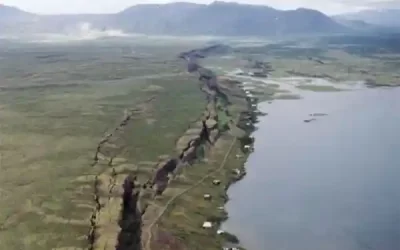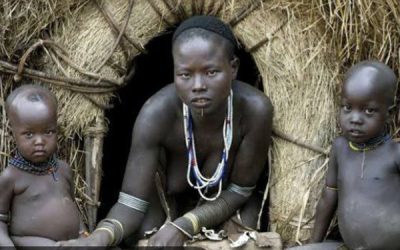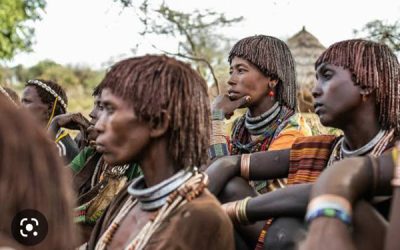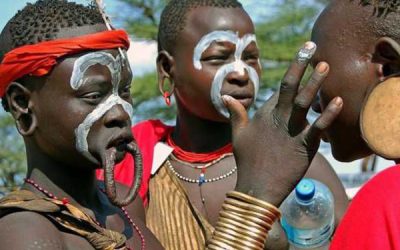Omo Valley Tribes and Cultures Tours – 7 Day
Day 1: Addis Ababa – Arba Minch
Flight from Addis Ababa to Arba Minch. In the afternoon, you’ll take a drive up the hill side to the highland community of Dorze. The Dorze people are famous for their skill as weavers and on a tour round the village, you will see some of their products. Even their houses are woven from bamboo. You can try your hand at spinning thread, and find out some of their many uses of the enset (false banana) plant. From there, you’ll return to Arba Minch, where you’ll stay the night.
Day 2: Arba Minch – Konzo
In the morning, you will take a boat trip on Lake Chamo to see the famous “crocodile market” – a stretch of sand where enormous Nile Crocodiles like to warm up in the sunshine. Sightings of hippos are also common on the lake. Then, leaving Arba Minch, the tour continues southwards, past Lake Chamo to Karat-Konso. The Konso Cultural Landscape, which includes 42 villages and surrounding farmland, is designated as a UNESCO World Heritage site. There are around 250,000 people living in this area, mostly in hilltop villages surrounded by high stone walls. Konso farmers use a sophisticated system of stone terracing to retain moisture and prevent erosion of the hillsides. The area is also famous for the waka (carved wooden funerary statues) that dot the landscape. The Konso people are thought to have lived in this area for at least 400 years and they speak a language belonging to the Cushtic family.
Day 3: Konzo – Turmei
From Karat-Konso, the journey continues, stopping on the way to see a village of the Tsemai people, who live around the Woito River. The Tsemai practice slash-and- burn agriculture, as well as animal husbandry. The spiritual leader of the Tsemai is the bogolko, who prays for rain, good harvests and the health of children. The Tsemai are considered as magicians by some people in surrounding urban areas, but they are also known as one of the most peaceful peoples among the ethnic groups of the Omo Valley. Alternatively, if itis a Tuesday, Thursday, or Saturday you may choose to visit a local market, rather than the Tsemai village The tour then continues south to Turmei, passing through an area occupied by the Hamer/Bana people. In the afternoon, you’ll either visit a traditional Hamer village or, if you are lucky, witness the Hamar’s famous bull jumping ceremony, which takes place when a Hamar man comes of age. He must successfully leap over a line of 8-20 cattle 4 times if he is to be allowed to marry, have children, and own cattle of his own. In the village, Hamer women wear elaborately decorated goat skins with beaded necklaces, bracelets and waistbands, usually black and red, with the number and type of necklaces worn denoting their marital status. Women decorate their hair with clay and butter and twist it into small braids. Men wear a clay cap which is painted and decorated with feathers and other ornaments.
Overnight: Hotel in Turmei.
Day 4: Turmei
From Turmei, you will visit a village of the Dassanech people. The Dassanech tribe, living around Omerate, is not strictly defined by ethnicity but has absorbed a wide range of different people over time. The Dassanech are divided into eight main clans, each of which is believed to have special powers over different things such as water, crocodiles, snakes, diseases, drought, eye infections, scorpion bites and muscular problems. Members of the same clan are forbidden from marrying (or even dancing with) each other. Both men an women of the Dassanech adorn themselves with beads and bracelets. In the afternoon, you may be lucky enough to see a Hamar Bull-jumping ceremony, or visit the Hamar village if you saw the bull-jumping ceremony on the previous day. At the end of the day, you’ll return to Turmei, where you’ll spend a second night.
Day 5: Turmei – Jinka
Leaving Turmei, the tour continues back north to Jinka, passing through an area occupied by the Hamer/Bana people. From Jinka, you’ll visit a village of the Ari people. The Ari people, who live in the fertile lands surrounding Jinka, predominantly practice settled agriculture and produce a variety of cereals, pulses, root crops, fruit and vegetables, as well as the cash crops coffee and cardamon. In rural areas, you may still see Ari women wearing traditional dresses made from the leaves of the false banana plant, and draped with colourful beads and bracelets. At the end of the day, you’ll return to Jinka, where you’ll spend the night.
Day 6: Jinka
From Jinka, you will spend the morning exploring a village of the Mursi. The Mursi people, who live in an almost inaccessible area between the Mago and Omo rivers, are famous for the clay lip-plates traditionally worn by women. There is much controversy surrounding the origins of these lip-plates with theories ranging from disfigurement to discourage slave raiders to a sign of beauty. Both men and women of the Mursi tribe practise scarification and cut their hair very short, often with patterns shaved into it. Men traditionally wear only a blanket tied at one shoulder, and women, a similarly-fashioned goat skin. The Mursi have a reputation for being aggressive and the men carry a Donga (large stick) for fighting. Ceremonial fights are also performed. Cattle are the Mursi’s most prized possession. They are used in virtually every significant social relationship, most notably marriage, where they are used as a dowry, paid to the bride’s father. They provide milk and blood, which form an integral part of the Mursi diet and the Mursi even name themselves after the colour of their favourite cattle. In the afternoon, you will visit the Jinka museum. Overnight: Hotel in Jinka
Day 7: Jinka – Addis Ababa
In the morning, you will take a flight from Jinka to Addis Ababa. In the afternoon, you’ll have a city tour of Addis Ababa, including its museums, churches and the ‘mercato, reputedly the largest market in Africa. Finally, the tour ends with dinner at a cultural restaurant in Addis Ababa, where you can sample local dishes and watch energetic traditional dances from across the country. Transfer to the airport for departure to your country.
Price
- Starting from 1050 USD
- Includes: Transportation, Meals, Accommodation, Entrance fees, Guide fees, non limited amount of mineral water.
- Excludes: Tips, Alcoholic drinks.




